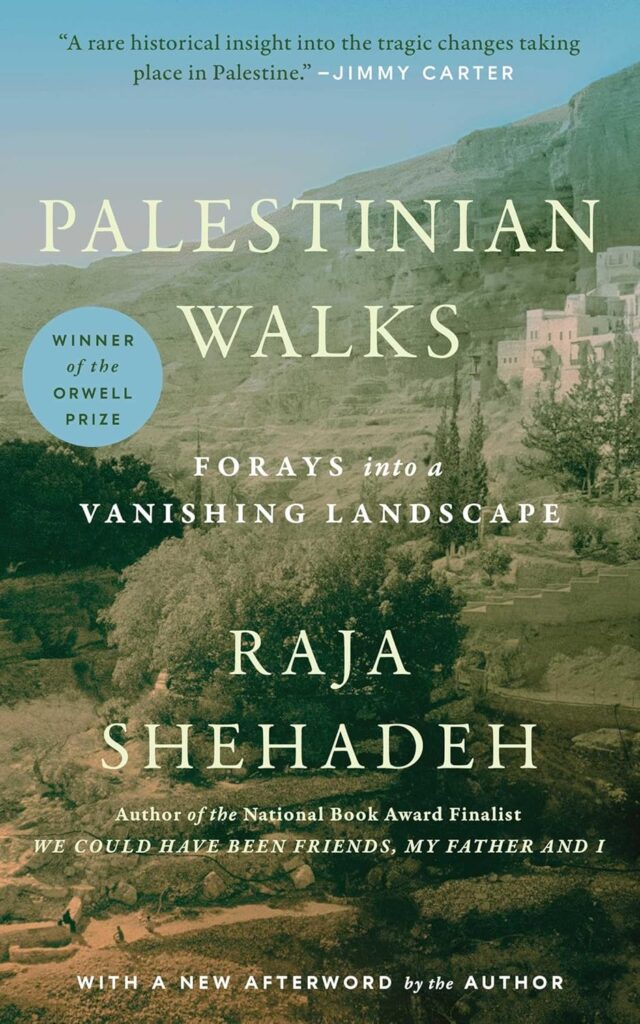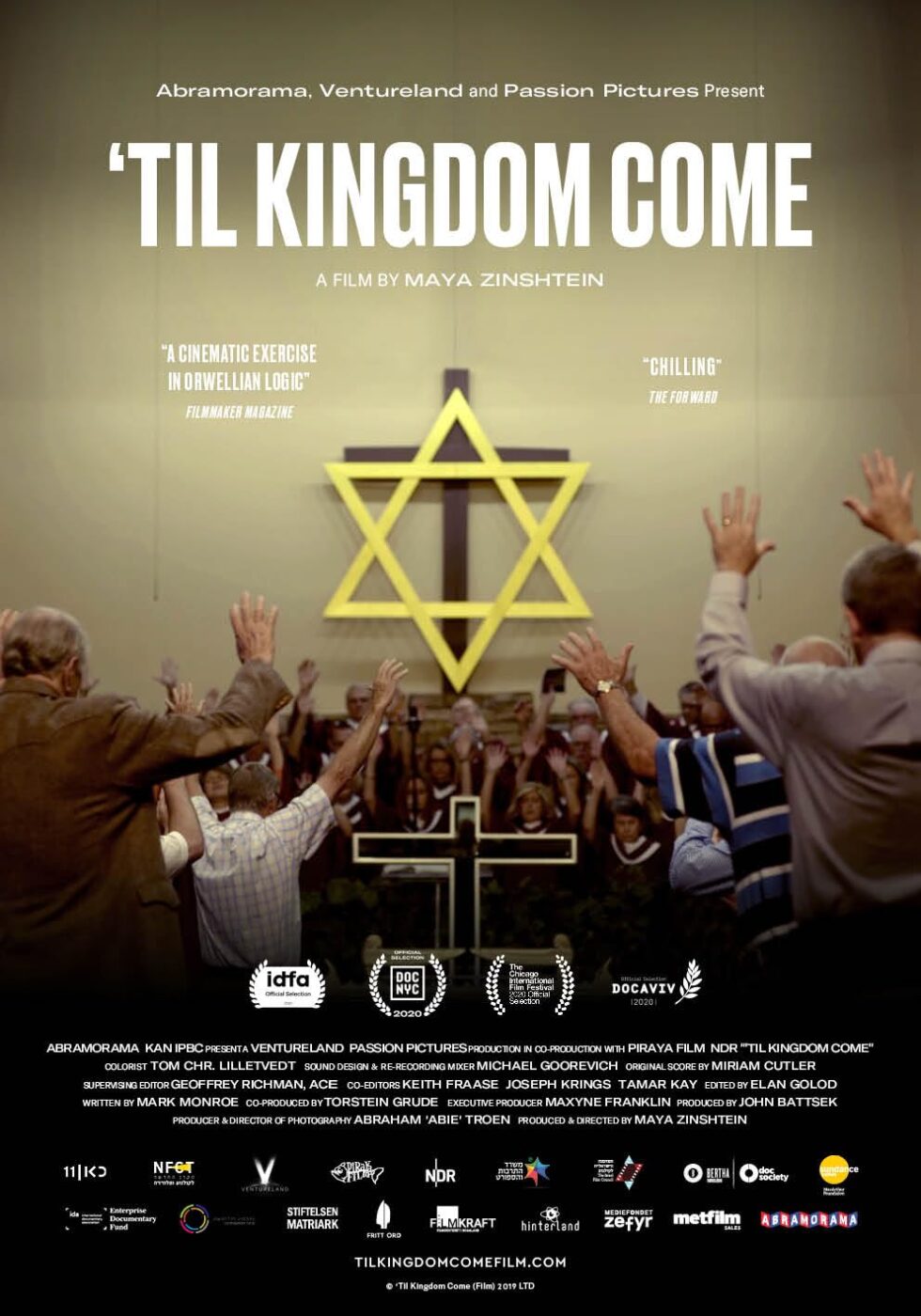“Raja Shehadeh’s Palestinian Walks provides a rare historical insight into the tragic changes taking place in Palestine.”
FORMER U.S. PRESIDENT Jimmy Carter
Holy Land Lost

The very words “Holy Land” evoke powerful imagery. But the scenes that come to mind are rapidly disappearing from the landscape.
The occupation of the West Bank — a military and political reality that dominates the lives of Palestinians — has become concretised: with massive housing projects connected by ribbons of highways; a wall and barbed wire barrier winding its way from north to south, cutting through villages, encapsulating others; and hundreds of checkpoints — all overtaking and transforming the once open terrain.
Raja Shehadeh has described all this in vivid detail in his most recent book, Palestinian Walks: Forays into a Vanishing Landscape. A hiker from a young age, Shehadeh tells his story in a novel way. Detailing six walks he has taken in and around his home in Ramallah during the last 30 years, he invites his readers to witness the transformations that have occurred, that increasingly circumscribed his movements and marred his beloved land.
In his early years, Shehadeh set out roaming the hillsides to discover the life his parents and grandparents lived. The hills of the West Bank, once described by Western travellers as desolate and barren, come to life in Shehadeh’s narrative.
Dry one season, yes, but in the spring they were covered with flowers and new life. Conforming to this rough environment, generations of Palestinian farmers adapted their lives to the seasons and mastered these hills, naming every spring, wadi (valley) and cliff, and cultivating olives, grapes and family plots. It was the world they knew and the land they loved.
As they defined the land, it, too, defined them, shaping Palestinian culture and social relations for generations.
This is what Shehadeh saw, in the beginning. The cycle of life, at one with its environment, that had existed for millennia. It was the Holy Land we know from picture postcards, lithographs and biblical stories. But it is being lost, and this is a tragedy — not only for the Palestinians, though especially for them.
“The biography of these hills is in many ways my own, the victories and failures of the struggle to save this land also mine. But the persistent pain at the failure of that struggle would in time be shared by Arabs, Jews, and lovers of nature anywhere in the world. All would grieve, as I have, at the continuing destruction of an exquisitely beautiful place.”
As the book progresses, the landscape changes; marked by the ever-increasing intrusions of the occupation. Walks became more difficult and, in some cases, fraught with danger.
“The other day I had to plead with a soldier to be allowed to return home. I told him that I really did not know a curfew had been imposed on Ramallah. I was away all day and hadn’t listened to the news. ‘I’m tired,’ I said, ‘please let me through.’ Oh, the humiliation of pleading with a stranger for something so basic.”
“How unaware many trekkers around the world are of what a luxury it is to be able to walk in the land they love without anger, fear or insecurity, just to be able to walk without political arguments… without the fear of losing what they’ve come to love, without the anxiety that they will be deprived of the right to enjoy it.”
As settlements grew (there are now almost half a million Israelis living in settlements in these occupied lands), not only did Palestinians lose ancestral lands and agricultural areas, they also lost freedom of movement, their way of life, and their hope for the future.
“The [settlement] master plan viewed our presence here as a constraint and was aimed at preventing ‘undesirable development’. By creating new human settlements where none existed, connecting them with roads and isolating existing ones, it would not only strangle our communities but also destroy this beautiful land, and in a matter of a few years change what had been preserved for centuries.”
Jerusalem, too, was impacted. At first, cut off from the rest of the West Bank by a ring of settlements and a maze of highways, and now by a meandering and oppressive wall, the heart has been excised from the rest Palestine. Both the city itself and its once surrounding communities have suffered. The impact has been economic, social, cultural and psychological.
“As we descended towards East Jerusalem… I realised that the beautiful Dome of the Rock was no longer visible. It was concealed by new construction. This was by design. Not only had Israeli city planners obstructed the view of this familiar landmark, they had also constructed a wide highway along the periphery of Arab East Jerusalem, restricting its growth and separating it from the rest of the city. Highways are more effective barriers than walls in keeping neighbourhoods apart. Walls can always be demolished. But once built, roads become a cruel reality that is more difficult to change. No visitor would now sigh, let alone fall on his knees as many a conqueror and pilgrim in the past had done, upon beholding the Old City nestled in the hills. Now contorted, full of obstructions, walls and ugly blocks, it is a tortured city that has lost its soul.”
There is much more to Palestinian Walks. Woven through the narrative are stories of the author’s family and accounts of legal challenges to land confiscations (Shehadeh is a noted human rights lawyer).
This is not an explicitly political book filled with diatribes and prescriptions. Nor is it a hopeful book. Shehadeh has written about a land fighting against time. “As our Palestinian world shrinks, that of the Israelis expands, with more settlements being built, destroying forever the wadis and cliffs, flattening hills, and transforming the precious land that many Palestinians will never know.”
This book is real, and it is disturbing, and deserves to be read by everyone who calls that land Holy.
Originally published in Al-Ahram Weekly, 10-16 July 2008 (Issue No. 905).
Book Details
| Title | Palestinian Walks: Forays into a Vanishing Landscape |
| Author | Raja Shehadeh |
| Publisher | Scribner |
| Publish Date | June 3, 2008 |
| Pages | 224 |
| Language | English |
| EAN/UPC | 9781416569664 |
About the author
Raja Shehadeh is one of Palestine’s leading writers. He is also a lawyer and the founder of the pioneering Palestinian human rights organization Al-Haq. Shehadeh is the author of several acclaimed books including Strangers in the House; Occupation Diaries; the Orwell Prize–winning Palestinian Walks, and We Could Have Been Friends, My Father and I, a finalist for the 2023 National Book Award and the Los Angeles Times Book Prize. In 2022, he was named an International Writer of the Royal Society of Literature. He lives in Ramallah, Palestine.
Listen to Raja Shehadeh speaking at the Rutgers Center for Security, Race & Rights annual Human Rights in Palestine lecture series on September 26, 2024
Palestinian attorney Raja Shehadeh provides a legal and historical examination of Israel’s use of spurious legal ploys to acquire Palestinian land in the West Bank and how all this relates to Israel’s colonial pursuits.
By Topic
Explore the site in BY TOPIC, A-Z.



!["Homeland: Oral Histories of Palestine and Palestinians" [Recommended]](https://epalestine.ps/sambahour/wp-content/uploads/2025/03/home-land-oral-histories.jpg)